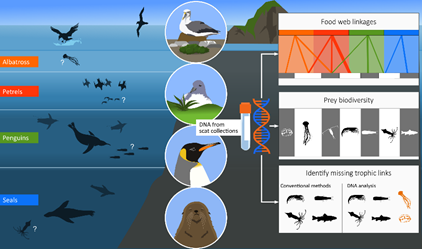
Julie McInnes (Institute for Marine and Antarctic Studies, University of Tasmania, Hobart, Australia) will give an on-line lecture entitled "The use of DNA-based diet analysis of higher-order predators as a conservation management tool: assessing fishery interactions, food-web linkages and ecosystem changes" via Zoom on 14 July. Julie holds an RJL Hawke Fellowship in Antarctic Science.
A description of her seminar follows:
“A key component of ecosystem monitoring programs that aim to support the maintenance of biodiversity and ecosystem function is sound knowledge of species composition and food web linkages. This information provides a foundation for assessing ecosystem changes and can allow causal links to be clarified (e.g. interactions between marine predators and fishery resources). Seals and seabirds are responsive and reflective of changes in the availability of lower trophic levels, which makes these predators ideal indicator species for changes in marine ecosystems. Dietary studies provide a mechanism to assess environmental and fisheries-related changes in marine systems, as well as the marine biodiversity of a region. DNA metabarcoding of predator scats is a non-invasive tool which allows the diet of a range of predator species to be investigated simultaneously, increasing our understanding of ecosystem connectivity and food web structure. This seminar will highlight the value of DNA diet analysis in conservation and management, including the assessment of seabird-fishery interactions in Tasmania, and provide an overview of the RJL Hawke Antarctic Fellowship. During this fellowship we will develop a marine ecosystem monitoring framework using top predator scat DNA to assess species biodiversity in the Subantarctic. By simultaneously studying the diet of a range of predators, we will resolve food web linkages and investigate the use of quantitative models integrating DNA sequence datasets. Through the collation of existing dietary data and new robust dietary information, we will provide a sound foundation for future monitoring programs to assess changes in species diversity and identify species that may be at risk from fishery engagement.”
Join the Zoom seminar on ID: 989 6500 4574; 13h00 Australian Eastern Standard Time (AEST).

 English
English  Français
Français  Español
Español